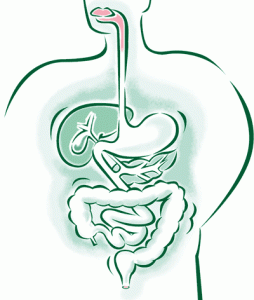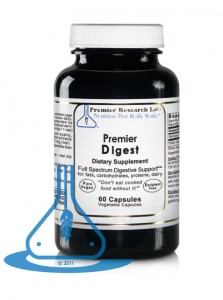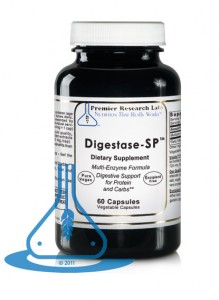Good Digestion: The Root of Quantum Health
The Digestive Process
 To digest food properly, especially cooked food, the body first releases ptyalin in the mouth as you chew food. Next, as the food enters the stomach, the stomach secretes Hydrochloric acid (HCL) and pepsin to continue breaking down the food. Then, the food travels to the small intestines, where it will spend several hours being digested.
To digest food properly, especially cooked food, the body first releases ptyalin in the mouth as you chew food. Next, as the food enters the stomach, the stomach secretes Hydrochloric acid (HCL) and pepsin to continue breaking down the food. Then, the food travels to the small intestines, where it will spend several hours being digested.
As the food enters the small intestine, the pancreas releases three main digestive enzymes: protease to digest protein; lipase to digest fat; and amylase to digest carbohydrates. Unfortunately, the ability of the pancreas to produce these enzymes slowly declines with age. The more cooked food we consume on a regular basis, the sooner the body’s capacity to make enzymes declines. In addition, the body’s capacity to produce enzymes can diminish dramatically with stress, illness, and exposure to toxic chemicals.
Premier Digest: Enzyme Supplement
 Tiny, highly active substances called enzymes play an amazing role in digestion. Enzymes function like protein catalysts. A catalyst is able to speed up or slow down a chemical reaction in the body. In digestion, enzymes are produced by the body to help completely breakdown food for proper absorption. During the digestive process, adequate numbers of active enzymes are critical to all known life processes. Without enzymes, life could not exist.
Tiny, highly active substances called enzymes play an amazing role in digestion. Enzymes function like protein catalysts. A catalyst is able to speed up or slow down a chemical reaction in the body. In digestion, enzymes are produced by the body to help completely breakdown food for proper absorption. During the digestive process, adequate numbers of active enzymes are critical to all known life processes. Without enzymes, life could not exist.
Premier Digest is a full spectrum Digestive Enzyme, Supporting Fats, Carbohydrates, Proteins and Diary, Especially Cooked Foods
Digestase: Enzyme Supplement
Multi-Enzyme Digestive Support for Proteins & Carbohydrates
This extraordinary plant-based enzyme formula supports the intestinal brush border cells to promote more complete digestion of carbohydrates and protein.
Digestase is important for those who used antibiotics for three months or more, or who want more specific immune support.
Beware of Junk Enzymes
 Beware of “junk” enzyme supplements. Digestive enzymes used in commercial digestive products can vary widely in quality. If the enzymes in a product have originated from an animal, its potency may be highly variable. In addition, animal-source enzymes may contain toxic tagalongs such as pesticides and synthetic hormone residues.
Beware of “junk” enzyme supplements. Digestive enzymes used in commercial digestive products can vary widely in quality. If the enzymes in a product have originated from an animal, its potency may be highly variable. In addition, animal-source enzymes may contain toxic tagalongs such as pesticides and synthetic hormone residues.
On the other hand, if enzymes are extracted from a plant source such as fungi (usually Aspergillus), they may be free from pesticides and hormones, but they may contain remnant fungal residues, which itself can be immune compromising.
Secondly, some plant enzyme products may be too highly heated in their extraction process, resulting in damaged, inactive enzymes.

